Abstract
Background Current approaches to the management of chronic nonspecific low back pain (CNSLBP) have shown limited effectiveness. It appears that disruption of cortical structure and function is a feature of CNSLBP and that these changes may contribute to current treatment failures. Sensorimotor retraining approaches have been shown to be effective in the management of other long-standing pain problems that are characterized by cortical dysfunction. Similar treatments may be an option for people with CNSLBP.
Objective The objectives of this study were to describe the effects of participation in a graded sensorimotor retraining program on pain intensity, interference of pain with daily life (pain interference), and self-reported disability and to evaluate the safety of the program.
Design A multiple-baseline, replicated, single-case design was used for this study.
Methods Three people with disabling CNSLBP were assessed weekly during a no-treatment baseline period. Each person then participated in a graded sensorimotor retraining program for a minimum of 10 weeks, during which clinical status was assessed weekly. Data collection continued weekly for 1 month after the end of formal treatment.
Results Pain intensity, pain interference, and disability all were reduced, and the improvements were maintained throughout the follow-up period. No adverse reactions to treatment were reported.
Limitations The findings are preliminary and were based on a single-case design. The observed improvements in clinical status may have been attributable to the effects of factors other than treatment, such as the effect of time and other, nonspecific effects.
Conclusions Positive outcomes were reported for 3 participants with CNSLBP after the completion of a graded sensorimotor retraining program. However, the findings are only preliminary and require replication with more-robust study designs.
Footnotes
Dr Wand, Mr O'Connell, and Ms Di Pietro provided concept/idea/research design. Dr Wand, Mr O'Connell, and Professor Bulsara provided writing. Dr Wand and Ms Di Pietro provided data collection. Dr Wand and Professor Bulsara provided data analysis. Dr Wand provided project management and fund procurement. Ms Di Pietro provided participants and clerical support. Dr Wand, Ms Di Pietro, and Professor Bulsara provided consultation (including review of manuscript before submission).
The authors thank Dr David Butler and the Neuro Orthopaedic Institute for providing access to the Recognise Web site, Professor Lorimer Moseley from Neuroscience Research Australia and the University of South Australia for his advice on the treatment model and comments on the manuscript, and the people who participated in this study.
Ethics approval for this study was obtained from The University of Notre Dame Australia Human Research Ethics Committee.
This research was supported by a seeding grant from The University of Notre Dame Australia Institute of Health and Rehabilitation Research Fogarty/Prendiville Bequest. Access to the Recognise Web site was provided gratis by the Neuro Orthopaedic Institute.
- Received April 28, 2010.
- Accepted December 16, 2010.












